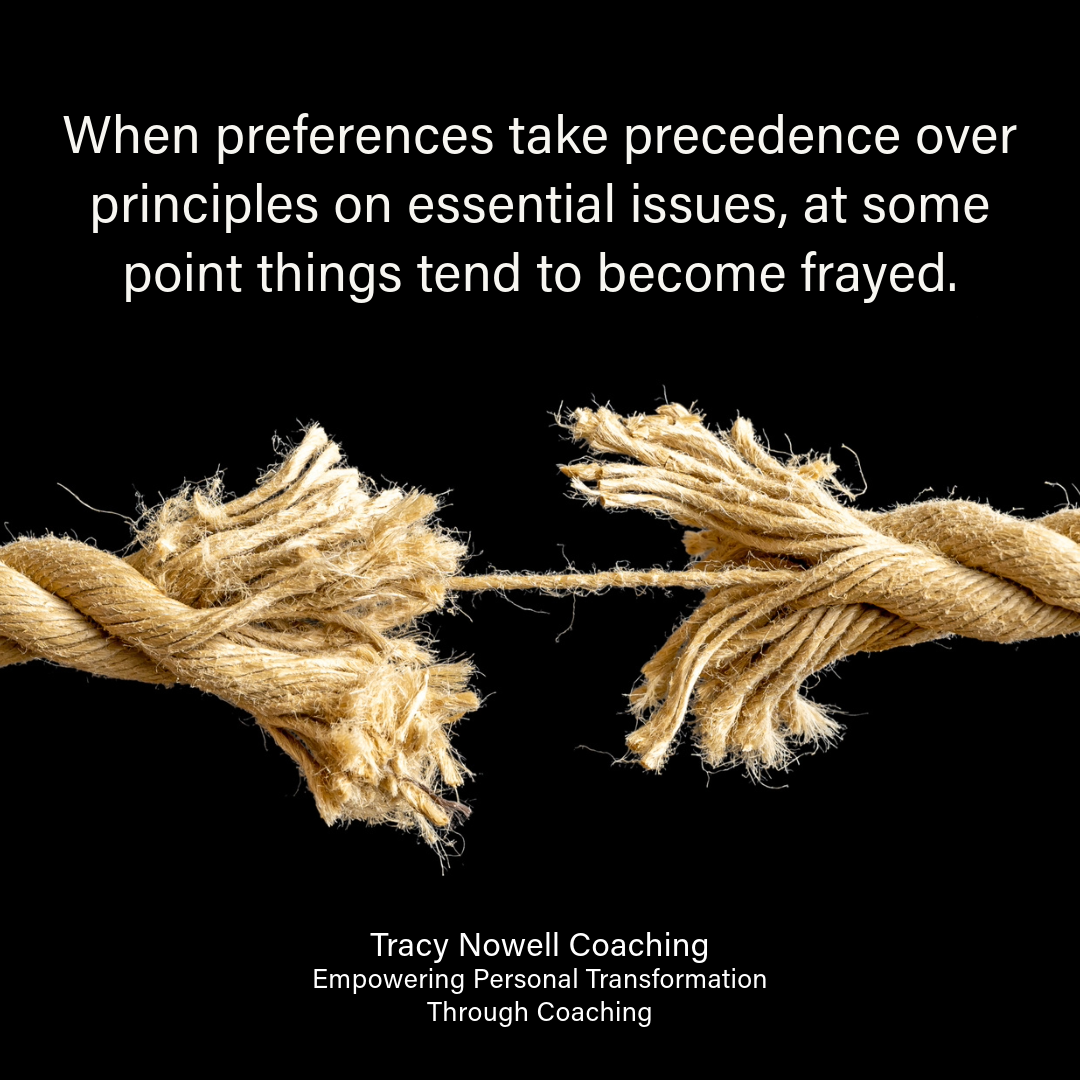Principles versus Preferences

What drives your decision-making process – your principles or preferences?
By preferences, I mean personally liking one thing, person, action or outcome over others or having the power or the opportunity to choose among alternatives or give an advantage or special treatment to certain people over others.
As we mature, we develop preferences based on our experience, environment, habits and the influence of others. As our preferences become internalized, they influence how we see ourselves, others and the world around us. They can also take the form of biases, affecting our thinking, actions and interactions with others and our decision-making.
In addition, we live in an age where we are constantly bombarded with hundreds of billions of dollars of advertising annually, in addition to the influence of social media and the abundant sources of news, information, and entertainment, and even our corporations, schools and universities – most all of which desire to influence your preferences towards your purchases, your vote, your opinions, your beliefs or your values.
So, what would your life be like if your decisions were always based on your preferences?
Your first thought might be to envision having everything you want, having everything your way – all of your likes and none of your dislikes. We do it all the time because we have the freedom to choose for ourselves.
However, on essential issues or when decisions materially affect others, preference-based decision-making can lead to suboptimal choices that are not in the best interests of the decision-maker or the best interests of others. As examples, please consider the following -
What happens to kids whose parents always let them have their way or give them everything they want as they grow up?
What would it be like to work at a company where the owners or leaders act in their self-interest, based on their personal preferences, while disregarding those they lead or the customers they serve?
Or how would you feel working or competing in an environment where advancement is not based on qualifications, character and performance but favoritism instead?
Based on my own experience and observations of others, choosing what we like best, what feels good or makes us feel better about ourselves, or possibly selfishly benefits us or those we favor without consideration of the consequences or how they might affect others, can result in -
- bad habits and poor health
- excessive debt and empty bank accounts
- damaged relationships, divorce and dysfunctional families
- job loss, job hopping or a lack of career advancement
- low-performing, fractured or failed companies, organizations, groups or teams.
- stress and overall dissatisfaction with life in general
However, according to Stephen Covey in his book Principle-Centered Leadership,
"Individuals and organizations ought to be guided and governed by a set of proven principles."
Why? Because without a principle-centered decision-making process, there are no fundamental truths, guidelines, guardrails, or directional markers for reference to keep on the right path as preferences fluctuate due to changing circumstances, influences, and experiences.
And when preferences and principles conflict, it can be challenging to make a decision. We may find that we must compromise our values and beliefs by prioritizing our preferences over our principles. Conversely, if we prioritize our principles over our preferences, we may have to make difficult choices requiring us to sacrifice our desires or preferred outcomes.
In addition, when preferences take precedence over principles on essential issues, things tend to become frayed at some point. And by frayed, I mean "damaged, weakened, or worn down by strain or irritation," according to Merriam-Webster dictionary. Our self-concept, relationships with others, and ties to our value system, beliefs, or fundamental truths can become so damaged that our connection with them wears thin and possibly severs.
When I encounter someone in coaching where this issue surfaces, I might ask some of the following questions.
- What fundamental truths, values and beliefs form your guiding or operating principles in making essential decisions?
- How does each align with your guiding or operating principles when considering your options?
- How might your decision process be favoring perceived immediate or short-term benefits?
- What could be the longer-term consequences of your choices?
- How might preferences or biases be influencing your decision?
- What advice have you received from others that you trust?
- How would you advise another person facing the same circumstances?
- How does your current decision align with your past choices?
- How might your choice affect decisions in this area in the future?
When following a principle-based approach, there is a foundational basis for answering these questions and finding clarity when faced with tough decisions because we have predetermined principles to evaluate and guide our choices. This approach leads to consistency in thought and action while ensuring the integrity of our decision-making process.
Finally, focusing on principles does not mean that our preferences do not come into play but that our principles are considered primary over our preferences when in conflict.
And to sum it all up, here is one of my favorite quotes from Stephen Covey –
"Correct principles are like compasses: they are always pointing the way. And if we know how to read them, we won't get lost, confused, or fooled by conflicting voices and values."